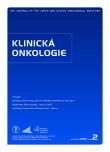-
Medical journals
- Career
Our Experience with Analysis of the PTEN Gene in Patients Suspected of Having Cowden Syndrome
Authors: P. Vasovčák 1; L. Foretová 2; A. Puchmajerová 1; M. Šenkeříková 3; J. Martínek 4; A. Křepelová 1
Authors‘ workplace: Ústav biologie a lékařské genetiky, FN Motol a 2. LF UK, Praha 1; Oddělení epidemiologie a genetiky nádorů, Masarykův onkologický ústav, Brno 2; Oddělení lékařské genetiky, FN Hradec Králové 3; Oddělení hepatogastroenterologie, IKEM, Praha 4
Published in: Klin Onkol 2010; 23(2): 111-114
Category: Original Articles
Overview
Backgrounds:
Cowden syndrome (CS) is a rare autosomal dominant disorder with an increased risk of breast, thyroid and uterine cancer development. The International Cowden Consortium has defined strict diagnostic criteria for individuals and families suspected of having CS. Patients and methods: We analyzed the genomic DNA of 16 patients by sequencing analysis and MLPA (multiplex ligation-dependent probe amplification) method.Results:
We found germline mutations, c.825_840del, resp. c.438delT, in 2 patients. Both patients fulfilled strict diagnostic criteria. The other patients, except one, who did not fulfil the criteria, did not harbour any pathogenic mutation. Patients not fulfilling strict diagnostic criteria were included in the study according to major CS criteria but not pathogenic.Conclusion:
Our results and information from relevant articles show that strict international criteria are well established and analysis of „CS-like“ patients has no significant prognostic meaning.Key words:
Cowden syndrome – breast cancer – thyroid cancer – hamartomas – mucocutaneous lesions
Sources
1. Lloyd KM 2nd, Dennis M. Cowden‘s disease. A possible new symptom complex with multiple system involvement. Ann Intern Med 1963; 58 : 136 – 142.
2. Nelen MR, van Staveren WC, Peeters EA et al. Germline mutations in the PTEN/ MMAC1 gene in patients with Cowden disease. Hum Mol Genet 1997; 6(8): 1383 – 1387.
3. Eng C. PTEN: one gene, many syndromes. Hum Mutat 2003; 22(3): 183 – 198.
4. Starink TM, van der Veen JP, Arwert F et al. The Cowden syndrome: a clinical and genetic study in 21 patients. Clin Genet 1986; 29(3): 222 – 233.
5. Waite KA, Eng C. Protean PTEN: form and function. Am J Hum Genet 2002; 70(4): 829 – 844.
6. Vasovcak P, Krepelova A, Puchmajerova A et al. A novel mutation of PTEN gene in a patient with Cowden syndrome with excessive papillomatosis of the lips, discrete cutaneous lesions, and gastrointestinal polyposis. Eur J Gastroenterol Hepatol 2007; 19(6): 513 – 517.
7. Marsh DJ, Dahia PL, Caron S et al. Germline PTEN mutations in Cowden syndrome‑like families. J Med Genet 1998; 35(11): 881 – 885.
8. Chen YM, Ott DJ, Wu WC et al. Cowden‘s disease: a case report and literature review. Gastrointest Radiol 1987; 12(4): 325 – 329.
9. Tsou HC, Teng DH, Ping XL et al. The role of MMAC1 mutations in early ‑ onset breast cancer: causative in association with Cowden syndrome and excluded in BRCA1 - negative cases. Am J Hum Genet 1997; 61(5): 1036 – 1043.
10. Ueda K, Nishijima M, Inui H et al. Infrequent mutations in the PTEN/ MMAC1 gene among primary breast cancers. Jpn J Cancer Res 1998; 89(1): 17 – 21.
Labels
Paediatric clinical oncology Surgery Clinical oncology
Article was published inClinical Oncology

2010 Issue 2-
All articles in this issue
- Treatment of Colorectal Liver Metastases: a Current View
- Prostate Bed Radiotherapy – When and What?
- Sentinel Lymph Node Identification Using Hysteroscopy in Patients with Endometrial Cancer
- The Use of Lenalidomide in the Treatment of Multiple Myeloma
- Monitoring the Effectiveness of Surgical Treatment of Malignant Pleural Effusions
- Low‑ Dose Radiotherapy in the Treatment of Plantar Fasciitis
- Our Experience with Analysis of the PTEN Gene in Patients Suspected of Having Cowden Syndrome
- Treatment of Recurrent Ovarian Cancer – a Retrospective Study
- Vaccination Against Human Papillomavirus in the Czech Republic
- Circulating Tumour Cells in Breast Cancer – Review
- Clinical Oncology
- Journal archive
- Current issue
- Online only
- About the journal
Most read in this issue- Low‑ Dose Radiotherapy in the Treatment of Plantar Fasciitis
- Prostate Bed Radiotherapy – When and What?
- Sentinel Lymph Node Identification Using Hysteroscopy in Patients with Endometrial Cancer
- Our Experience with Analysis of the PTEN Gene in Patients Suspected of Having Cowden Syndrome
Login#ADS_BOTTOM_SCRIPTS#Forgotten passwordEnter the email address that you registered with. We will send you instructions on how to set a new password.
- Career

